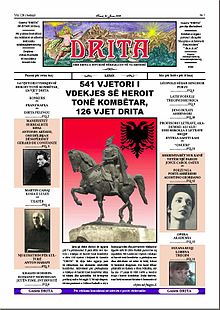- Drita (magazine)
-
For other uses, see Drita (disambiguation).
Gazeta Drita Editor Granit Zela Categories Literature Frequency Weekly (Sunday) Publisher The current publisher is the Association of the Young Modern Artists of Albania; prior publishers included Petro Poga, Shahin Kolonja, and the Albanian League of Writers and Artists, First issue January 14, 1883 Country Albania Language Albanian Website www.artistet.org/drita Drita magazine (Drita meaning "light" in English) is an Albanian literary magazine published by the Association of the Young Modern Artists of Albania (Albanian: Shoqëria e Artistëve të Rinj Modernë). Drita was one of the first magazines in the Albanian language.[1] It has been published for 127 years with some interruptions.[2]
Contents
History: 1883-1922
Drita was one of the first magazines published in Albanian. It was initially printed in Istanbul, Turkey (then Ottoman Empire) in 1883 for the first time. The Central Committee for Defending Albanian Rights, the Society for the Printing of the Albanian writings and their president, Sami Frashëri, were the main contributors of the magazine, however their identity was secret at that time. The magazine's publisher was Petro Poga. Drita changed its name to Dituria (meaning in English "Knowledge") after the third issue[3] and moved the magazine's base to Bucharest.[4] The magazine was placed under the direction of Pandeli Sotiri.
The publication was known to be against the wishes of the authorities and one of the writers, Naim Frashëri signed his name as just "D" to try to avoid being identified. The committee that supported the magazine also published books of the bible in Albanian. They managed to publish both the Gospel of Matthew and the book of Genesis[4]
This magazine was not just the first scholarly magazine in Albanian,[4] it was part of the first modern use of written Albanian. The magazine was only possible because of the work of Koto Hoxhi, Sami Frashëri, Pashko Vasa and Jani Vreto who had devised an alphabet for expressing the Albanian language in 1879. Based on this is was possible to create the first alphabet book in Albanian, translate the Bible and publish Drita.[4]
To avoid censureship, the magazine focused mainly on cultural issues. Publications continued through 1885 until the Ottoman Government halted its publication completely. At the same time the Ottoman government halted the existence of the Society for the Printing of the Albanian writings, that had been established in Istambul by Sami Frashëri.[5]
Publications restarted later in the 19th century first in Bucarest, Romania, and later in Sofia, Bulgaria, by Shahin Kolonja and the magazine retook its original name, Drita.[6] Several articles published by Petro Nini Luarasi, who was editor-in-chief at that time, appeared on the magazine in the 1906-1908 period.
History: 1922-1945
In 1922 the magazine restarted its publications again under Petro Poga. This time it was published in Gjirokaster, and now in an independent Albania.[7] Urani Rumbo published several articles in Drita, which discussed the need to improve the rights and education of girls and women in Albania. In 1920 Urani Rumbo and others had published a declaration which signified the birth of the Women's Union in Albania (Albanian: Lidhja e Gruas, the first prominent feminist organization in Albania.[8] The magazine closed again in 1924 due to clashes with the Fan Noli government.[7] and reopened later and published by Zoi Xoxa. During the Fascist Italy presence in Albania in 1939-43 and the Nazi Germany presence in Albania in 1943-44 the magazine had to close for the third time.[7]
History: 1945-present
The magazine reopened in 1945 right after World War II and became the official magazine of the Albanian League of Writers and Artists. Editor in chief of the magazine for some time was Teodor Keko,[9] a well known Albanian writer. The disbandment of the League in 2007,[10] had the Association of the Young Modern Artists of Albania take over the magazine, which is still currently published.[2]
Notes and references
- ^ The Albanians: an ethnic history from prehistoric times to the present, Edwin E. Jacques, p.296, 1995, accessed 19 April 2010
- ^ a b "Official Website". http://www.artistet.org/drita/. Retrieved 4 April 2010.
- ^ SAMI FRASHËRIOR ŠEMSEDDIN SAMI ?MYTHOLOGIZATION OF AN OTTOMANINTELLECTUAL IN THE MODERN TURKISH ANDSOCIALIST ALBANIAN HISTORIOGRAPHIES BASEDON « SELECTIVE PERCEPTION »Bülent Bilmez* page 18 [1]
- ^ a b c d The Albanians: an ethnic history from prehistoric times to the present, Edwin E. Jacques, p.290, 1995, accessed April 2010
- ^ The crescent and the eagle: Ottoman rule, Islam and the Albanians, 1874-1913 By George Walter Gawrych page 88 [2]
- ^ Özdalga, Elisabeth (2005). Late Ottoman society: the intellectual legacy. Taylor & Francis, Inc. p. 299. ISBN 0415341647. http://books.google.com/books?id=sRtTyyGIgXsC&pg=PA329&dq=Mehmed+Rasim+Kalakula&cd=1#v=onepage&q=Mehmed%20Rasim%20Kalakula&f=false. Retrieved 2010-06-19.
- ^ a b c Drita, Issue of 12 october 2008 first page
- ^ de Haan, Franciska; Krasimira Daskalova, Anna Loutfi (2006). Biographical dictionary of women's movements and feminisms in Central, Eastern, and South Eastern Europe: 19th and 20th centuries. G - Reference,Information and Interdisciplinary Subjects Series. Central European University Press. pp. 475–77. ISBN 9637326391. http://books.google.com/books?id=hsgQjbgBOAkC&q=Urani+Rumbo#v=snippet&q=Urani%20Rumbo&f=false.
- ^ "Teodor Keko". Toena Publishing House. http://www.toena.com.al/toena/katalogu_i_botimeve/letersi_artistike_shqipe/Teodor_Keko.php.
- ^ Riza Lahi (2008-09-28). "Zyhdi Morava, under whose hands died the Drita Magazine is arrested Albanian: "ARRESTOHET ZYHDI MORAVA" …NË DUART E TË CILIT DHA SHPIRT GAZETA "DRITA"". http://lajme.dervina.com/archive/9657-2580:550/%E2%80%9CARRESTOHET-ZYHDI-MORAVA%E2%80%9D-%E2%80%A6NE-DUART-E-TE-CILIT-DHA-SHPIRT-GAZETA-%E2%80%9CDRITA%E2%80%9D.htm. Retrieved 4 April 2010.
Categories:- Publications established in 1883
- Newspapers published in Albania
- Weekly magazines
- Albanian literary magazines
Wikimedia Foundation. 2010.

